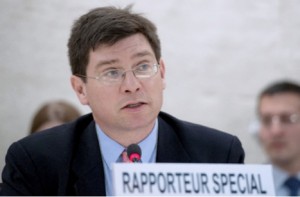
As issues of asylum seekers and migration increasingly become a global concern an international panel has agreed that detention of children is not justified and that alternatives must be sought.
While the UN General Assembly discussed International Migration and Development in New York earlier this month, the Office of the High Commissioner for Human Rights, the International Detention Coalition and the government of Liechtenstein held a side event on alternatives to detention of child migrants and their families.
Panelists highlighted the need for care as a first response to irregular child migrants. UN Special Rapporteur on Human Rights of Migrants, Mr Francois Crepeau (pictured), highlighted the fact that despite governments defending use of detention facilities by referencing deterrence, as well as legitimate concerns over security and dangers to the public, there is no empirical evidence that detention deters migrants. Detention is never an appropriate response for children he said. Yet governments continue to detain children despite it being contrary to their best interests and therefore in contravention of Article 3 of the Convention on the Rights of the Child.
Mr Grant Mitchell, Director of the International Detention Coalition, added that the risk of abuse and long term psychological damage faced by children in detention means that even a short period in detention is never in the best interest of the child. While there is no perfect solution, there are cheaper and more compassionate alternatives. Mr Mitchell particularly highlighted the models used by the Netherlands and Belgium.
The panel concluded with the Ambassador of Belgium, Mr Bertrand de Crombrugghe, discussing the model used in his country. In Belgium each family is assigned to a coach and is provided with accommodation in the community. Children are free to come and go as they please and the coach works with the family to meet their legal, medical and societal needs. Mr Crombrugghe also highlighted that the cost of this model is significantly cheaper than detention centres.
Overall the panel agreed that the fight against the stereotype that seeking asylum is criminal must continue, that public services must not be linked to immigration enforcement, that there will never be a perfect solution to this complex issue and that the campaign for the rights of all people in detention, particularly children must continue, along with advocating for a care-first model, rather than repression.
– Maddy Pillans